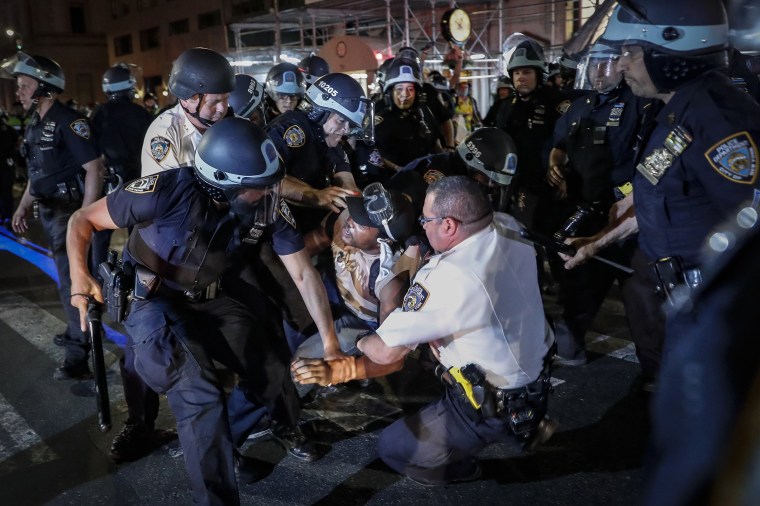The ongoing demonstrations against police violence and the arrests of protesters have thrust bail funds, many of which are local and volunteer-run, into the national spotlight, attracting online trolls looking to disrupt the fundraising efforts.
Multiple bail funds and groups organizing protests have experienced disruptions of service in recent days, including the national BlackOUT Collective, a local bail fund in Arizona, and a national Jewish organization raising money for bail funds and racial justice policy change, among others.
On Sunday night, a five-page list of bail funds and lawyers offering pro bono services to arrested protesters was posted to the anonymous message board 4chan, where individuals who engage in coordinated harassment campaigns often gather.
The list came with a directive: “now is the time to strike down their MONEY and LAWYERS and leave them up s--- creak on their own.”
It’s not clear that the disruptions were caused by users of 4chan. The message board operates anonymously and those who conduct attacks on websites typically hide their identities, too. The sites might have experienced outages due to an elevated volume of traffic, which is also a form of cyberattack, in which malicious actors flood a website with so much traffic the site temporarily shuts down.
The network protection firm Cloudflare wrote in a blog post this week that attacks on advocacy sites have experienced a 1,120 percent increase from the month prior.
The National Bail Fund Network estimates that in the last week, more than 2 million people have donated money to a local protest bail fund.
“Bail funds are a normal part of the organization of protests,” said Joan Donovan, the research director at the Shorenstein Center on Media, Politics and Public Policy at the Harvard Kennedy School.
“People have to get bailed out of jail, and these groups are starting to circulate and disrupt the bail funds because it is crucial to the working of the protest. The bail funds are a point of leverage because you can only raise money in public,” she said.
Organizers from the Black People’s Justice Fund - Metro Phoenix, a collective of black-led organizations of the Phoenix metro area that focuses on raising money to support black people who are arrested in the course of protests or are incarcerated, said it had experienced some outages Wednesday and earlier in the week that prevented people from donating to the fund.
The BlackOUT Collective, a national group that supports direct actions for groups working on racial justice, has had issues with its payment processing this week. Those issues have since been resolved, said Chinyere Tutashinda, the co-founder and director of the group.
She said she’s concerned that some local groups and organizers working in racial justice and local bail funds might not be used to targeted attacks by online hate groups.
“There are a lot of organizations that might not be used to this level of targeting and they might see it as an inconsistency on their website and not know that they’re being targeted,” Tutashinda said.
Bail funds and groups that are raising money for racial justice organizing should be aware that they are being targeted, but it should not be a deterrent to continuing their work, she said, adding there are security measures they can take to protect themselves.
The anonymous message board where the list of bail funds was posted also encouraged readers to find the names of people who are donating to bail fund sites.
“You can go on gofundme and gather names of donors,” one anonymous poster wrote. Others posted screenshots of lists of people who donated to bail funds and made their full names visible.
Individuals could get contacted because they donated to a bail fund and not realize that it’s potentially a form of coordinated harassment.
“They might not know why they are getting contacted or they might think that the thing they donated to is illegitimate,” Donovan said.
Donovan added that it’s important for people who are donating to bail funds to realize payment processing issues are not necessarily the fault of the bail fund, but rather that the site may be dealing with digital attacks from networked factions looking to subvert funds intended for protesters.
There are a number of steps bail funds and organizers of racial justice groups can take to protect their digital security, said Sarah Aoun, the chief technologist of the Open Technology Fund, a nonprofit that advocates for human rights and open societies.
“A lot of the bail funds have been organized around Venmo using phone numbers and in a lot of cases people are setting up accounts with their actual phone numbers,” Aoun said. “No one should be using their personal phone numbers to do this type of organizing because that can be tied to a specific individual.”
Instead, Aoun recommends organizers use a phone number created with an online service such as Google Voice or Burner, which generate separate numbers that aren’t tied to any one person’s personal phone.
Aoun suggests organizers not use their personal email addresses either, but rather create a new one just for the bail fund.
Anyone who might become a target of harassment should also be sure to set up two-factor authentication on all their accounts, which will require a second form of identity verification besides a password before allowing anyone to log in, she said.
“Make sure you have different passwords for all of your accounts,” Aoun said. “Otherwise if one password is exposed, it can be used to open other accounts associated using the same password managed by the organizers.”
